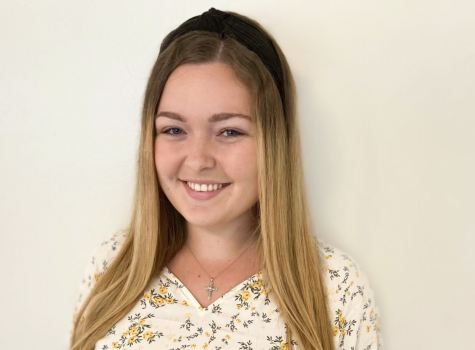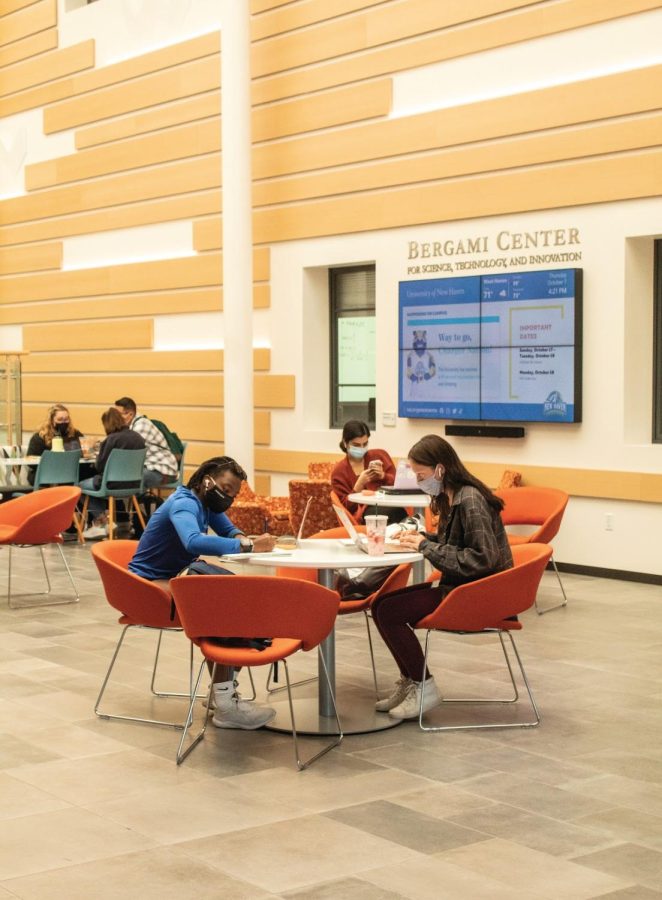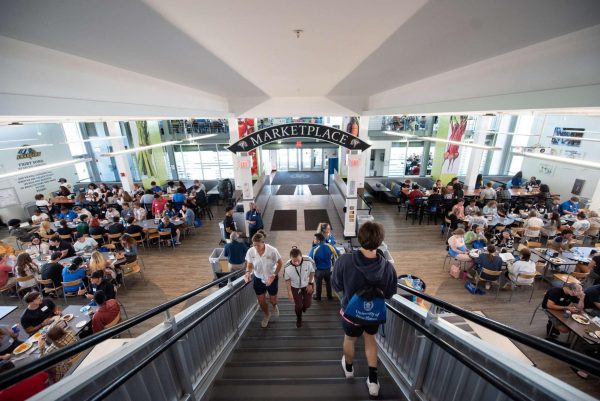The Charger Bulletin’s midterm survival guide
Photo courtesy of Lismarie Pabon
Students work inside of the Bergami Center, West Haven.
If they haven’t started for you already, midterms are right around the corner. This is time to focus on not only your studies but on taking better care of yourself. Don’t wait until the night before your exams, presentations, essays and projects to remember what’s due.
During stressful times, it is essential to care for your body and mind. With practice, that better prepares you for finals season and gives you a greater chance of success. Being stressed and overwhelmed may be a norm for college students, but it shouldn’t have to be.
Remember to not overflow your stress bucket.
This analogy, developed by Alison Brabban and Douglas Turkington, is taught in police and investigative psychology courses. This concept allows someone to focus on their health with the metaphor of a bucket slowly filling up with stress.
Too much stress negatively affects your physical and mental being, so there needs to be a method of containing it. The daily coping mechanisms that we practice, such as exercising, relaxation and a good night’s sleep, are represented by figurative valves that release stress from our bucket. Inactivity and procrastination are examples of unhealthy mechanisms that lead to more stress, which causes your bucket to overflow.
There are three core types of coping mechanisms which include problem-focused, emotion-focused, and meaning-focused. Problem-focused mechanisms include creating to-do lists and asking for support. Emotion-focused mechanisms include meditation and exercise. Meaning-focused mechanisms are when individuals use “cognitive strategies to derive and manage the meaning of the situation.”
Take advantage of the university’s on-campus resources.
The University of New Haven is home to many departments, such as the Writing Center, Counseling and Psychological Services (CAPs) and the Center for Student Success (CSS).
Director of the Writing Center, Lauren Boasso reminds students that the Writing Center’s peer tutors are trained to assist students with any writing assignment, including lab reports.
“Midterms and finals are a stressful time for many, and I want to remind students that they are not alone,” says Boasso, “Meeting with a peer tutor to talk through a writing assignment can do wonders for a student’s confidence in their writing ability.”
To make an appointment with the Writing Center, go to newhaven.mywconline.com. Walk-in appointments for quick questions are allowed.
Director of CAPs, Paige Bartels, said that during midterms, her team has upcoming stress-relieving events lined up. On Monday, CAPS hosted a “Calming stress & anxiety with a guided experience.” On Tuesday, “Midterm Yoga: movement & mindfulness” was held in the Beckerman Recreation Center with Jennifer Walsh. At noon on Thursday, there’s a make-your-own slime event at the Myatt Center with Gicel Corado.
Bartels encouraged students to reach out and said, “We know this is a stressful time, especially with midterms coming up. We’d encourage students to take care of themselves to the best of their ability, remembering they are whole people outside of school.”
For more information about CAPs, check out MyCharger or their Instagram page @unewhavencaps.
The CSS helps students any time during the semester, especially after midterm grades are released. By using a strength-based advising model, Appreciative Advising, success advisors try to help their students meet their academic goals for the semester.
“We strive to offer students very positive experiences as they interact with our success advisors and other staff members,” said Aschlee Riendeau, CSS assistant director.
To make an appointment with the CSS, go to Navigate or call the office at 203-479-4584.
Get out of your room; a change of scenery is good for studying!
Research says that a change of scenery lessens boredom, which can decrease productivity. The university is home to many study spaces dedicated to students to unwind, socialize, do work and study. The Myatt Center and commuter lounges along with study rooms in residential dorms offer secluded areas to complete work, as well as other places on campus.
The Bergami Center for Science, Technology and Innovation is the newest addition to campus life and is one of the most popular spots because of its seating areas, private study rooms, classrooms, computer labs and the Bucknall Café. Throughout, bustling students pack into the chairs in the rooms, with access to their own space, whiteboards, computers and privacy.
The Marvin K. Peterson Library is a more laid-back and cozy environment for study sessions, with private rooms available. New Haven students have unlimited access to “popular research databases, writing and subject guides.” Here is a quieter and more relaxed atmosphere to host study sessions with classmates and peers. The third floor is a silent place whereas the basement is meant to be a more collaborative area for students.
Prioritize yourself
Mental health and care are just as important as doing well on exams. Students should remember to stay organized and review their material, but also to set aside time to focus on “me time.”
Pacing yourself and taking 10 to 15-minute breaks allow you to refresh your mind and recharge. Cramming everything into one study session will leave you feeling anxious, overwhelmed and burnt out. You can also use the Pomodoro Technique, where you break your time into 25-minute work increments and then take five-minute breaks in between sessions.
With this comes a proper sleep schedule. As essential as it may feel to pull an all-nighter, your body will thank you for the next day as getting a good night’s sleep helps your brain.

Elisa D’Egidio is a senior studying criminal justice with a concentration in crime analysis and a minor in English. Elisa has been an active staff writer...







